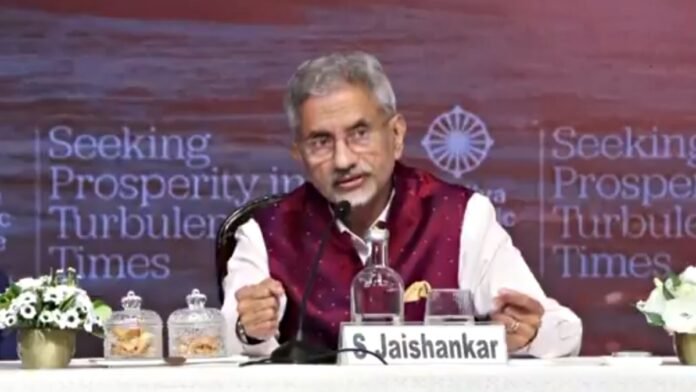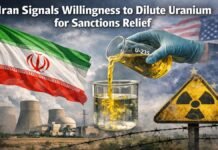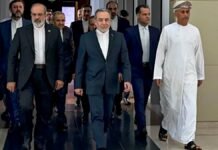
Key Points:
- External Affairs Minister S. Jaishankar declares US tariffs on India “unfair,” particularly the additional 25% levy on Russian oil imports
- India refuses to compromise on “red lines” in bilateral trade negotiations despite combined 50% tariff burden
- Jaishankar points out double standards: European Union and China buy more Russian energy but face no equivalent penalties
- Two QUAD ministerial meetings held in 2025; grouping remains “vibrant and effective” despite trade frictions
- India signals willingness to reduce Russian oil trade but insists on respecting strategic autonomy and national interest
- Trade negotiations ongoing since March 2025; fifth round concluded in September with no final agreement yet
New Delhi: Speaking at the Kautilya Economic Conclave 2025 on Sunday, External Affairs Minister Dr. S. Jaishankar reiterated India’s strong objection to the punitive tariff regime imposed by the Trump administration. The US has levied a total of 50% tariffs on Indian exports a 25% “reciprocal” tariff imposed in April 2025 to address trade imbalances, plus an additional 25% penalty specifically targeting India’s purchase of Russian oil. Jaishankar called the second levy “very unfair,” stating: “We have publicly said we regard this as unfair, which has picked on us for sourcing energy from Russia”.
“Red Lines” in Trade Negotiations
Despite ongoing tensions, India and the United States have held five rounds of negotiations for a Bilateral Trade Agreement since March 2025, with the most recent round concluding in late September. However, no final landing ground has been reached. Jaishankar made India’s position crystal clear: “Whatever happens at the end of the day, there has to be a trade understanding with the US… But it has to be an understanding where our bottom lines, our red lines are respected. In any agreement, there are things you can negotiate and there are things you can’t. I think we are pretty clear about that”.
#WATCH | 4th Kautilya Economic Conclave | Delhi: On India-US issues, EAM Jaishankar says, "Yes, we have issues with the US today. A big part of it is the fact that we have not arrived at a landing ground for our trade discussions, and the inability so far to reach there has led… pic.twitter.com/d89Rxf7WQ4
— ANI (@ANI) October 5, 2025
He emphasized that while the US is the world’s largest market and most countries have reached trade understandings with Washington, India will not compromise on core national interests simply to secure a deal.
Double Standards on Russian Oil
Jaishankar strongly criticized what he described as selective targeting of India over Russian energy purchases, noting that countries with “far more antagonistic relationships with Russia” continue to buy Russian oil and gas without facing equivalent sanctions. He pointed out that China is the largest purchaser of Russian oil, the European Union is the biggest buyer of Russian LNG, and several nations have experienced larger trade surges with Russia since 2022 yet none faced the same punitive tariffs as India.
At a previous event in August, Jaishankar had bluntly stated: “If you have a problem buying oil or refined products from India, don’t buy it. Nobody forces you to buy it. Europe buys, America buys, so you don’t like it, don’t buy it”. He underscored that India’s Russian oil imports help stabilize global energy markets and serve both national and international interests, especially during economically fragile times.
India Signals Flexibility on Russian Energy
Despite defending India’s strategic autonomy, Jaishankar indicated that New Delhi is willing to reduce its oil trade with Russia compared to earlier levels. This represents a potential compromise in ongoing negotiations, though India insists any reduction must align with its energy security needs and not be dictated by external pressure. India has also increased its purchases of US oil in recent years, making the American criticism seem inconsistent.
QUAD Remains Strong Despite Strains
Addressing concerns about the future of the Quadrilateral Security Dialogue (QUAD) amid bilateral tensions, Jaishankar reassured that the grouping remains resilient. Two important QUAD foreign ministers’ meetings were held in 2025 the first shortly after President Trump assumed office demonstrating continuity in strategic cooperation. Jaishankar stated: “The QUAD remains vibrant and effective. A balanced and responsible assessment of current challenges is essential. We should neither completely ignore the problems nor dismiss them as overly serious”.
However, reports suggest the QUAD Leaders’ Summit scheduled for 2025 in India is now uncertain due to ongoing trade frictions, with some experts questioning whether Trump will attend. Before the summer trade crisis, the summit had been planned for November, but domestic issues and bilateral tensions have complicated scheduling.
India’s Active Global Role
Concluding his remarks, Jaishankar emphasized India’s commitment to maintaining international cooperation and dialogue during a period of global instability. He noted that the world is witnessing major shifts including increased sanctions regimes, the rise of cryptocurrencies, the US becoming a major energy exporter, and China’s dominance in renewable energy requiring adaptive and principled diplomacy.
India has positioned itself as a key player on international forums, advocating for continuity in global agreements and multilateral institutions while defending its strategic autonomy and national interests.
Economic Impact and Future Outlook
The 50% combined tariff on Indian exports represents one of the highest penalties imposed on any US trading partner and has significant implications for sectors including steel, aluminum, automobiles, and technology. India responded by reducing GST on hundreds of goods in September 2025 to boost domestic consumption and mitigate potential tariff impacts.
Experts warn that prolonged trade tensions could undermine mutual trust, complicate defense procurement relationships, and threaten joint regional initiatives like the QUAD, potentially pushing India toward deeper engagement with Russia or China.




















































